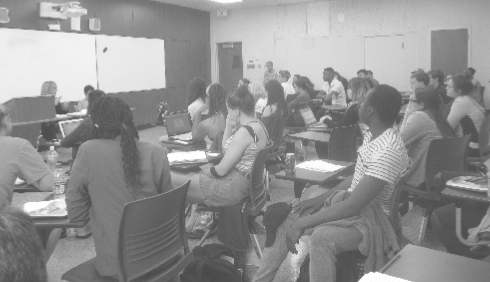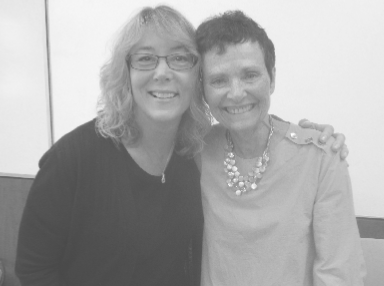By Destiny Diggs
Staff Writer
On Thursday, Oct. 5, during common hour, students gathered to fill their stomachs as well as their minds. Students met with assistant managing editor of Newsday, Maryann Skinner, and human resources professional, Beth Repeta. The experienced professionals provided students with skills from an employer’s perspective, giving insights on the do’s and don’ts of resume writing and interviewing.

CACD students taking notes and learning the fundamental skills of resume writing and interviewing.
Students held onto every word the professionals said; first learning that the purpose of a resume is to present oneself in the best way possible to the employer. Skinner and Repeta told students that before creating a resume, first think about the job that they currently have and to connect it to the job that they see themselves having in the future. The resume is a concentrated description of past and present work experiences; it displays what makes them different to the potential employer.
“Make sure you give the complete package,” Skinner said. A resume should separate one from others applying for the same position. In order to do so it is important to stand out in the first few sentences. Use action words and describe previous work experience thoroughly. “It’s helpful to show the employer what you know,” Repeta said. A bad resume can be the cause of not getting the interview.
Employers are busy and have countless applicants each day. Skinner and Repeta experience this first hand with interviewees, and talked about how they separate the good from the bad. When it comes to interviewing, they told students that researching the company is vital. It is important to know what the company is about and “to show what you know about the company during the interview,” according to Skinner. “Have a good summary of what it is that we do. Practice and prepare,” Repeta said. She then explained how to dress professionally for men and women. It is safe for men to wear slacks, a collared shirt, and shoes, while it is safer for females to overdress and wear a dress. “I find it that females often underdress,” Skinner said.

Beth Repeta (left), Maryann Skinner (right) speakers of the CACD Hosted Interview & Resume Workshop
Skinner advised students to show up to an interview 10-15 minutes ahead of the scheduled time and no earlier or later than that. Showing up early looks like you are eager and are serious about the position you are applying for and also gives you time to fill out paperwork and focus before walking into the interview, said Skinner. “Give a firm handshake and look your potential employer in the eye,” Repeta said. “In the interview be confident, speak clearly, and don’t fidget.”
The interview is not only an opportunity for the employer to learn about the interviewee, but for the interviewee to learn about the employer. “It’s okay to bring questions,” explained Repeta. She suggested asking questions like, ‘what does it take to be successful in your company?’ And, ‘how did others in the company succeed?’ Not only is it useful to ask questions, but it is also wise to be prepared to answer questions. Employers will often ask questions such as: how are you under stress? And where do you see yourself in 5 years? Use your opportunity wisely because the interview has the power to change your career status in a matter of minutes.
What one does after the interview is just as important as what one does during the interview. What helps potential employees stand out from the rest is following up with the company, and thanking them for the opportunity. “I find it nice when applicants follow up with me after the interview and I remember that person,” Skinner said. If the applicant does not hear from the employer, it is acceptable to reach out to the company asking for an update on the status of their application.
Lastly, both speakers told students that social media can have a major impact on the employer’s decision about an applicant’s application. Have a LinkedIn and present yourself in a good light on all social media platforms. Also, having an online portfolio is an important factor employers take into consideration.“If you are working in journalism, you have to be careful about what you post. It must be unbiased,” Repeta said. Be careful of what you post on social media sites like Facebook, Twitter and Instagram because it could cost you a job.
Having professionals come and talk to students was an enlightening moment for many. Students were able to see where they could potentially go. Many mistakenly overlook the fundamentals of a resume and interviewing, but without being taught how to go about these things correctly, there is no job, there is no career, and there is no success. Students were able to have Skinner and Repeta review their resumes and make suggestions following the workshop.




Be First to Comment